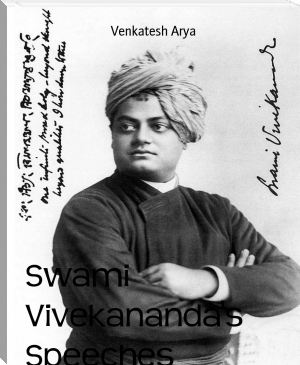Swami Vivekananda's Speeches - Venkatesh Arya (motivational novels .TXT) 📗

- Author: Venkatesh Arya
Book online «Swami Vivekananda's Speeches - Venkatesh Arya (motivational novels .TXT) 📗». Author Venkatesh Arya
And so universal is this belief, held by Shankara, in the all-inclusiveness of the Vedas that there is even a Hindu proverb that if a man loses his cow, he goes to look for her in the Vedas!
Shankara further affirms that obedience to ceremonial is not knowledge. Knowledge of God is independent of moral duties, or sacrifice or ceremonial, or what we think or do not think, just as the stump is not affected when one man takes it for a ghost and another sees it as it is.
Vedanta is necessary because neither reasoning nor books can show us God. He is only to be realised by superconscious perception, and Vedanta teaches how to attain that. You must get beyond personal God (Ishvara) and reach the Absolute Brahman. God is the perception of every being: He is all there is to he perceived. That which says "I" is Brahman, but although we, day and night, perceive Him; we do not know that we are perceiving Him. As soon as we become aware of this truth, all misery goes; so we must get knowledge of the truth. Reach unity; no more duality will come. But knowledge does not come by sacrifice, but by seeking, worshipping, knowing the Atman.
Brahmavidyâ is the highest knowledge, knowing theBrahman; lower knowledge is science. This is the teaching of the Mundakopanishad or the Upanishad for Sannyâsins. There are two sorts of knowledge — principal and secondary. The unessential is that part of the Vedas dealing with worship and ceremonial, also all secular knowledge. The essential is that by which we reach the Absolute. It (the Absolute) creates all from Its own nature; there is nothing to cause, nothing outside. It is all energy, It is all there is. He who makes all sacrifices to himself, the Atman, he alone knows Brahman. Fools think outside worship the highest; fools think works can give us God. Only those who go through the Sushumnâ (the "path" of the Yogis) reach the Atman. They must go to a Guru to learn. Each part has the same nature as the whole; all springs from the Atman. Meditation is the arrow, the whole soul going out to God is the bow, which speeds the arrow to its mark, the Atman. As finite, we can never express the Infinite, but we are the Infinite. Knowing this we argue with no one.
Divine wisdom is to be got by devotion, meditation, and chastity. "Truth alone triumphs, and not untruth. Through truth alone the way is spread to Brahman" — where alone love and truth are.
THURSDAY, July 11, 1895.
Without mother-love no creation could continue. Nothing is entirely physical, nor yet entirely metaphysical; one presupposes the other and explains the other. All Theists agree that there is a background to this visible universe, they differ as to the nature or character of that background. Materialists say there is no background.
In all religions the superconscious state is identical. Hindus, Christians, Mohammedans, Buddhists, and even those of no creed, all have the very same experience when they transcend the body. . . .
The purest Christians in the world were established in India by the Apostle Thomas about twenty-five years after the death of Jesus. This was while the Anglo-Saxons were still savages, painting their bodies and living in caves. The Christians in India once numbered about three millions, but now there are about one million.
Christianity is always propagated by the sword. How wonderful that the disciples of such a gentle soul should kill so much! The three missionary religions are the Buddhist, Mohammedan, and Christian. The three older ones, Hinduism, Judaism and Zoroastrianism, never sought to make converts. Buddhists never killed, but converted three-quarters of the world at one time by pure gentleness.
The Buddhists were the most logical agnostics. You can really stop nowhere between nihilism and absolutism. The Buddhists were intellectually all-destroyers, carrying their theory to its ultimate logical issue. The Advaitists also worked out their theory to its logical conclusion and reached the Absolute — one identified Unit Substance out of which all phenomena are being manifested. Both Buddhists and Advaitists have a feeling of identity and non-identity at the same time; one of these feelings must be false, and the other true. The nihilist puts the reality in non-identity, the realist puts the reality in identity; and this is the fight which occupies the whole world. This is the "tug-of-war".
The realist asks, "How does the nihilist get any idea of identity?" How does the revolving light appear a circle? A point of rest alone explains motion. The nihilist can never explain the genesis of the delusion that there is a background; neither can the idealist explain how the One becomes the many. The only explanation must come from beyond the sense-plane; we must rise to the superconscious, to a state entirely beyond sense-perception. That metaphysical power is the further instrument that the idealist alone can use. He can experience the Absolute; the man Vivekananda can resolve himself into the Absolute and then come back to the man again. For him, then the problem is solved and secondarily for others, for he can show the way to others. Thus religion begins where philosophy ends. The "good of the world" will be that what is now superconscious for us will in ages to come be the conscious for all. Religion is therefore the highest work the world has; and because man has unconsciously felt this, he has clung through all the ages to the idea of religion.
Religion, the great milch cow, has given many kicks, but never mind, it gives a great deal of milk. The milkman does not mind the kick of the cow which gives much milk. Religion is the greatest child to be born, the great "moon of realisation"; let us feed it and help it grow, and it will become a giant. King Desire and King Knowledge fought, and just as the latter was about to be defeated, he was reconciled to Queen Upanishad and a child was born to him, Realisation, who saved the victory to him.(From thePrabodha-chandrodaya, a Vedantic Sanskrit masque.)
Love concentrates all the power of the will without effort, as when a man falls in love with a woman.
The path of devotion is natural and pleasant. Philosophy is taking the mountain stream back to its force. It is a quicker method but very hard. Philospophy says, "Check everything." Devotion says, "Give the stream, have eternal self-surrender." It is a longer way, but easier and happier.
"Thine am I for ever; henceforth whatever I do, it is Thou doing it. No more is there any me or mine."
"Having no money to give, no brains to learn, no time to practice Yoga, to Thee, O sweet One, I give myself, to Thee my body and mind."
No amount of ignorance or wrong ideas can put a barrier between the soul and God. Even if there be no God, still hold fast to love. It is better to die seeking a God than as a dog seeking only carrion. Choose the highest ideal, and give your life up to that. "Death being so certain, it is the highest thing to give up life for a great purpose."
Love will painlessly attain to philosophy; then after knowledge comes Parâbhakti (supreme devotion).
Knowledge is critical and makes a great fuss over everything; but Love says, "God will show His real nature to me" and accepts all.
RABBIA
Rabbia, sick upon her bed,
By two saints was visited —
Holy Malik, Hassan wise —
Men of mark in Moslem eyes.
Hassan said, "Whose prayer is pure
Will God's chastisements endure."
Malik, from a deeper sense
Uttered his experience:
"He who loves his master's choice
Will in chastisement rejoice."
Rabbia saw some selfish will
In their maxims lingering still,
And replied "O men of grace,
He who sees his Master's face,
Will not in his prayers recall
That he is chastised at all !"
— Persian Poem
FRIDAY, July 12, 1895. (Shankara's Commentary.)
Fourth Vyasa Sutra. "Âtman (is) the aim of all."
Ishvara is to be known from the Vedanta; all Vedas point to Him (Who is the Cause; the Creator, Preserver and Destroyer). Ishvara is the unification of the Trinity, known as Brahmâ, Vishnu, and Shiva, which stand at the head of the Hindu Pantheon. "Thou art our Father who takest us to the other shore of the dark ocean" (Disciple's words to the Master).
The Vedas cannot show you Brahman, you are That already; they can only help to take away the veil that hides the truth from our eyes. The first veil to vanish is ignorance; and when that is gone, sin goes; next desire ceases, selfishness ends, and all misery disappears. This cessation of ignorance can only come when I know that God and I are one; in other words, identify yourself with Atman, not with human limitations. Dis-identify yourself with the body, and all pain will cease. This is the secret of healing. The universe is a case of hypnotisation; de-hypnotise yourself and cease to suffer.
In order to be free we have to pass through vice to virtue, and then get rid of both. Tamas is to be conquered by Rajas, both are to be submerged in Sattva; then go beyond the three qualities. Reach a state where your very breathing is a prayer.
Whenever you learn (gain anything) from another man'swords, know that you had the experience in a previous existence, because experience is the only teacher.
With all powers comes further misery, so kill desire. Getting any desire is like putting a stick into a nest of hornets. Vairâgya is finding, out that desires are but gilded balls of poison.
"Mind is not God" (Shankara). "Tat tvam asi" "Aham Brahmâsmi" ("That thou art", "I am Brahman"). When a man realises this, all the knots of his heart are cut asunder, all his doubts vanish". Fearlessness is not possible as long as we have even God over us; we mustbe God. What is disjoined will be for ever disjoined; if you are separate from God, then you can never be one with Him, and vice versa. If by virtue you are joined to God, when that ceases, disjunction will come. The junction is eternal, and virtue only helps to remove the veil. We areâzâd (free), we must realise it. "Whom the Self chooses" means we are the Self and choose ourselves.
Does seeing depend upon our own efforts or does it depend upon something outside? It depends upon ourselves; our efforts take off the dust, the mirror does not change. There is neither knower, knowing, nor known. "He who knows that he does not know, knows It." He who has a theory knows nothing.
The idea that we are bound is only an illusion.
Religion is not of this world; it is "heart-cleansing", and its effect on this world is secondary. Freedom is inseparable from the nature of the Atman. This is ever pure, ever perfect, ever unchangeable. This Atman you can never know. We can say nothing about the Atman but "not this, not this".
"Brahman is that which we can never drive out by any power of mind or imagination." (Shankara).
* * *
The universe is thought, and the Vedas are the words of this thought. We can create and uncreate this whole universe. Repeating the words, the unseen thought is aroused, and as a result a seen effect is produced. This





Comments (0)